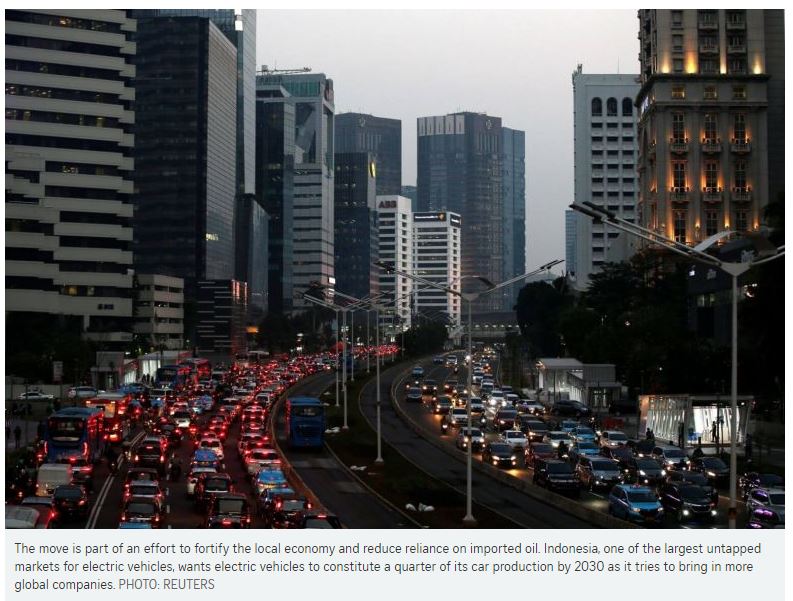Indonesia plans auto-rules overhaul to form electric-car hub as it vies with Singapore, Thailand
JAKARTA (BLOOMBERG) – Indonesia is planning a slew of incentives for electric-car manufacturers and drivers as it competes with nearby Singapore and Thailand to become the dominant force in South-east Asia for the sector.
The move is part of an effort to fortify the local economy and reduce reliance on imported oil. Indonesia, one of the largest untapped markets for electric vehicles, wants EVs to constitute a quarter of its car production by 2030 as it tries to bring in more global companies.
It has already lured investment from Toyota Motor Corp. and SoftBank Group Corp, according to a draft government strategy seen by Bloomberg.
The incentives are aimed at accelerating the adoption of battery-powered cars in Indonesia and building a base for the production and export of such vehicles. They include lower taxes for manufacturers and buyers of electric cars, and benefits for EV owners, such as special parking areas, the draft that’s only awaiting the president’s approval shows.
“This regulation is the largest overhaul of Indonesian automotive industry and it is an ambitious as well as a brave move by the government,” said Jeffrosenberg Tan, head of investment strategy at PT Sinarmas Sekuritas. “We hope this will lead to huge investments in EV infrastructure and will be followed through by the development of the supply chain ecosystem.”
President Joko Widodo said in a statement on Thursday that he will “surely” sign the decree once he receives it, without elaborating on the specifics of the new rules. “We can go ahead and prepare the infrastructure to support electric vehicles,” he said.
The rules would change taxation of vehicles so they would be levied based on fuel consumption and carbon emissions instead of body type and engine size, favoring electrified vehicles. Under current rules, a US$65,000 BMW X3 sDrive sport utility vehicle carries a lower luxury tax rate than a US$58,000 Hybrid-powered Toyota Camry because sedans have been considered a more luxurious car type.
The new rules will also require electric-car makers to gradually increase the amount of locally produced parts to 80% by 2030, according to the draft. Producers of electric motorcycles would need to meet that requirement already in 2026.
A number of global carmakers have committed billions dollars in investments even before the new rules have kicked in. Toyota, which has the biggest market share in Indonesia, has said it plans to spend US$2 billion to build hybrid-vehicle plants in the country. Demand for such autos is rising in Indonesia, according to Anton Jimmi Suwandy, a marketing director at Toyota’s local unit.
Hyundai Motor is set to build two plants, including an electric-vehicle unit, in Indonesia by investing US$1 billion, according to Indonesian Coordinating Minister for Maritime Affairs Luhut Pandjaitan. SoftBank said this week it will invest US$2 billion in Indonesia through ride-hailing giant Grab over the next five years and plans to explore investment opportunities in the country’s electric-vehicle, battery and renewable energy sectors.
Source: https://www.straitstimes.com/business/economy/indonesia-plans-auto-rules-overhaul-to-form-electric-car-hub


 English
English




